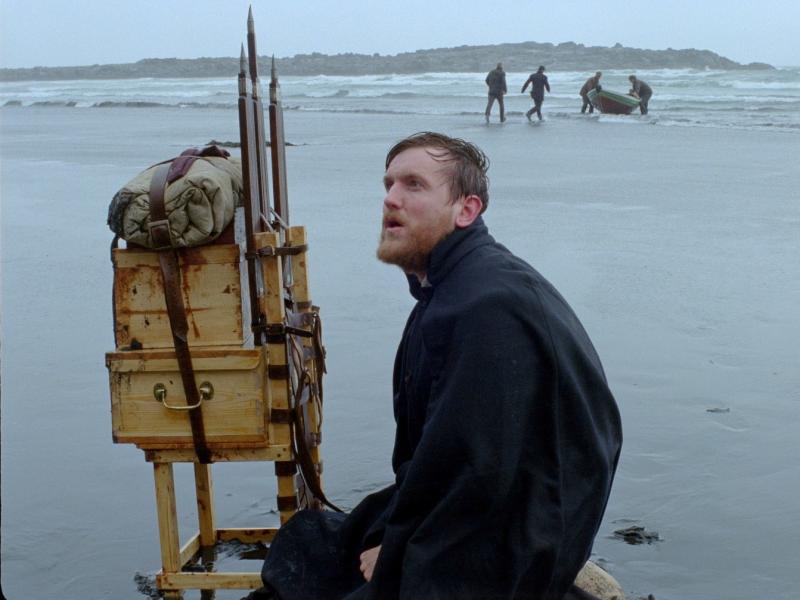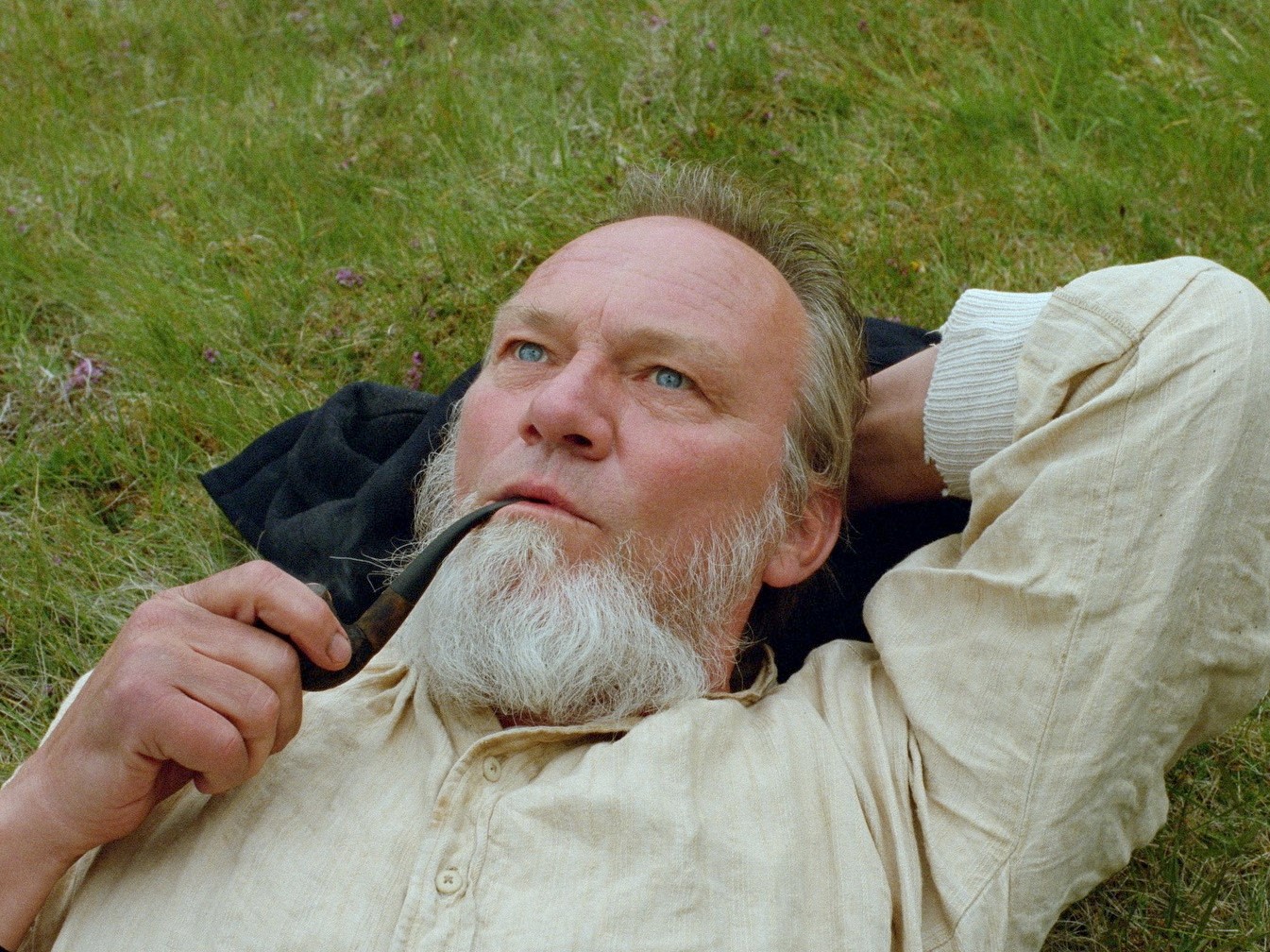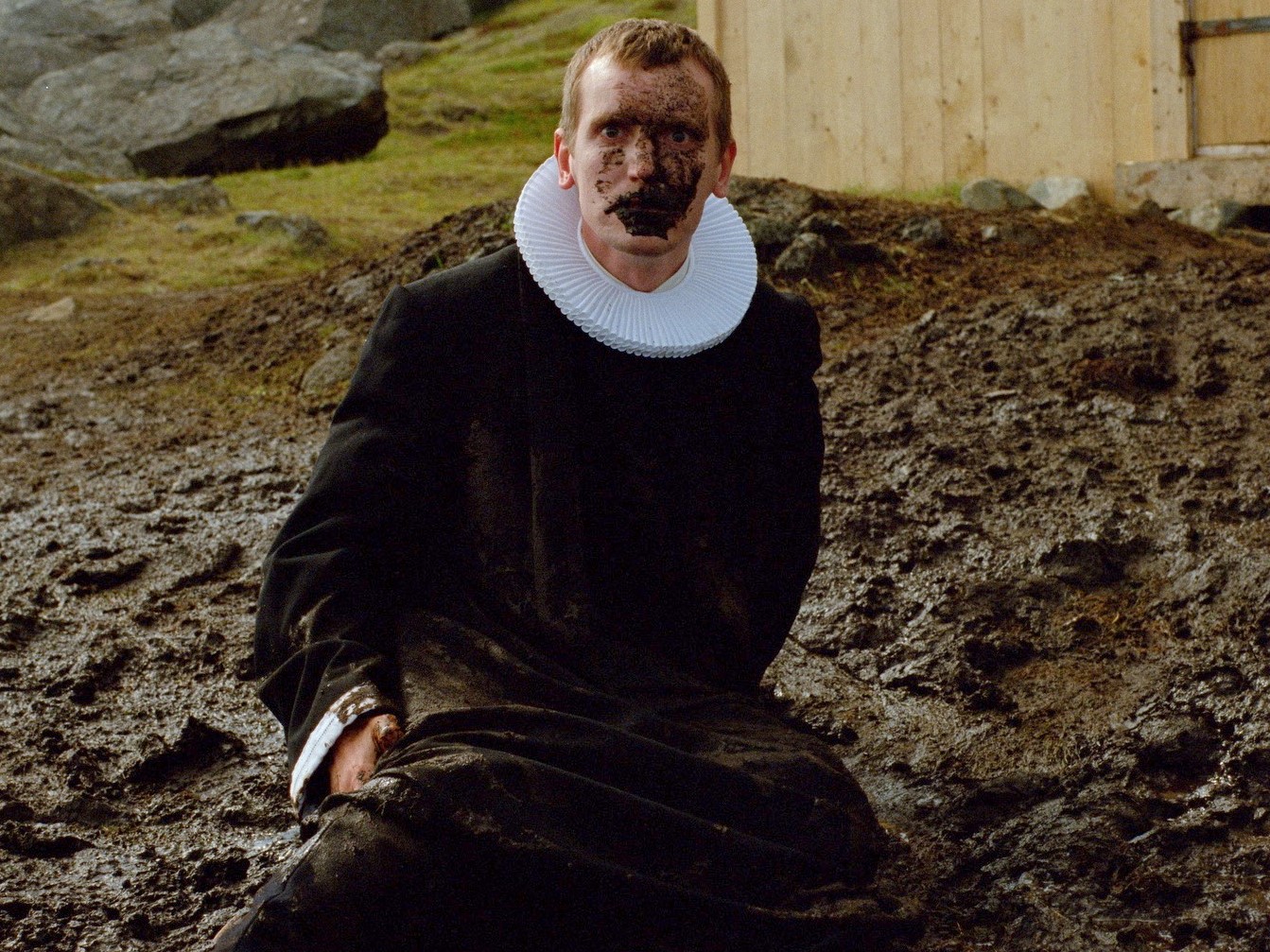Godland review - a sly saga | reviews, news & interviews
Godland review - a sly saga
Godland review - a sly saga
Iceland becomes a Danish priest's heart of darkness in a visceral epic

Iceland’s soul lies in its interior, a forbidding heartland which overwhelms 19th century Danish priest Lucas (Elliott Crosset Hove) on his ill-considered posting to this colonial backwater.
Director Hlynur Pálmason showed his talent for snapping unbending male psyches in a country of physical extremes in A White, White Day, a film as visceral as Scorsese in its riven machismo, Malick-like in its vaporous, uncanny landscapes, and wholly Icelandic in its saga-resembling trials and consequences.
Simmering masculine conflict sharpens the brew here too, though both films are laced with humour. The earlier work's bonily imposing Ingvar Sigurðsson returns as Ragnar, pictured below, an Icelandic guide unimpressed by “Danish devil” Lucas as he shepherds him through fast-running rivers and mountain passes. His absurdly dark folk songs are matched by his skill on harmonica, played at a wedding’s summer ease along with dancing and wrestling, the latter an initially comic excuse to take Lucas down a peg. But even the priest’s grappling proves stubborn. The antagonists represent Denmark and Iceland, colony and colonised, city and country. The loss of a translator strands both men. Lucas’s unwillingness to learn Icelandic casts Ragnar as a dumb brute every time he speaks it, and Lucas as an arrogant colonist when he won’t listen.
 Lucas’s fanaticism isn’t in Christ – his faith is typically faulty – but his sense of superiority to his native flock. His dangerous ignorance finds expression in arduously photographing his harsh new home while staying aloof from its people, carrying his camera's tripod like spears. Carl (Jacob Hauberg Lohmann), the Danish dignitary at his village destination, partly shares this mindset, condescendingly laughing at native table manners. His beautiful Danish-Icelandic daughter Anna (Vic Carmen Sonne), though, seduces Lucas, desperately seeing him as an escape from country limits. She meanwhile flies free of earthly bonds on horseback.
Lucas’s fanaticism isn’t in Christ – his faith is typically faulty – but his sense of superiority to his native flock. His dangerous ignorance finds expression in arduously photographing his harsh new home while staying aloof from its people, carrying his camera's tripod like spears. Carl (Jacob Hauberg Lohmann), the Danish dignitary at his village destination, partly shares this mindset, condescendingly laughing at native table manners. His beautiful Danish-Icelandic daughter Anna (Vic Carmen Sonne), though, seduces Lucas, desperately seeing him as an escape from country limits. She meanwhile flies free of earthly bonds on horseback.
Godland is a true epic, filmed with the sort of real-world endurance which made Apocalypse Now and early Herzog so gripping. Pálmason grew up and still lives in its territory, catching some scenes – a rotting horse, a volcano’s glowing flow – over years, filming and living inseparable. The camera’s momentous crawl down a waterfall to the insignificant humans at its foot, and the springy, sodden green of a place with a whole vocabulary for rain, portrays a divine, indifferent land. References to Western pioneers include a nod to John Wayne’s iconic screen-door exit in The Searchers, but Pálmason contends this is equally Iceland’s history, making Godland its own Northern thing.
 His characters are slippery, partly or wholly pining for another’s state, for escape or acceptance between worlds. This reflects Pálmason himself, born and raised in Godland’s terrain, but educated in Copenhagen, and so viewing both backgrounds critically. Godland is a horror comedy of Icelandic brutishness and Danish arrogance.
His characters are slippery, partly or wholly pining for another’s state, for escape or acceptance between worlds. This reflects Pálmason himself, born and raised in Godland’s terrain, but educated in Copenhagen, and so viewing both backgrounds critically. Godland is a horror comedy of Icelandic brutishness and Danish arrogance.
Ragnar’s final confession to Lucas is one a true man of God would welcome, despite its stinging conclusion, showing Pálmason’s understanding of faith. Lucas, though, is by now beyond such entreaties, broken and half-mad. Godland’s eventual violence is short and nasty and true to the sagas, but too neat, the only misstep in its satisfyingly subtle, shifting balance.
rating
Explore topics
Share this article
Add comment
The future of Arts Journalism
You can stop theartsdesk.com closing!
We urgently need financing to survive. Our fundraising drive has thus far raised £49,000 but we need to reach £100,000 or we will be forced to close. Please contribute here: https://gofund.me/c3f6033d
And if you can forward this information to anyone who might assist, we’d be grateful.

Subscribe to theartsdesk.com
Thank you for continuing to read our work on theartsdesk.com. For unlimited access to every article in its entirety, including our archive of more than 15,000 pieces, we're asking for £5 per month or £40 per year. We feel it's a very good deal, and hope you do too.
To take a subscription now simply click here.
And if you're looking for that extra gift for a friend or family member, why not treat them to a theartsdesk.com gift subscription?
more Film
 London Film Festival - from paranoia in Brazil and Iran, to light relief in New York and Tuscany
'Jay Kelly' disappoints, 'It Was Just an Accident' doesn't
London Film Festival - from paranoia in Brazil and Iran, to light relief in New York and Tuscany
'Jay Kelly' disappoints, 'It Was Just an Accident' doesn't
 Iron Ladies review - working-class heroines of the Miners' Strike
Documentary salutes the staunch women who fought Thatcher's pit closures
Iron Ladies review - working-class heroines of the Miners' Strike
Documentary salutes the staunch women who fought Thatcher's pit closures
 Blu-ray: The Man in the White Suit
Ealing Studios' prescient black comedy, as sharp as ever
Blu-ray: The Man in the White Suit
Ealing Studios' prescient black comedy, as sharp as ever
 The Woman in Cabin 10 review - Scandi noir meets Agatha Christie on a superyacht
Reason goes overboard on a seagoing mystery thriller
The Woman in Cabin 10 review - Scandi noir meets Agatha Christie on a superyacht
Reason goes overboard on a seagoing mystery thriller
 London Film Festival 2025 - crime, punishment, pop stars and shrinks
Daniel Craig investigates, Jodie Foster speaks French and Colin Farrell has a gambling habit
London Film Festival 2025 - crime, punishment, pop stars and shrinks
Daniel Craig investigates, Jodie Foster speaks French and Colin Farrell has a gambling habit
 I Swear review - taking stock of Tourette's
A sharp and moving tale of cuss-words and tics
I Swear review - taking stock of Tourette's
A sharp and moving tale of cuss-words and tics
 A House of Dynamite review - the final countdown
Kathryn Bigelow's cautionary tale sets the nuclear clock ticking again
A House of Dynamite review - the final countdown
Kathryn Bigelow's cautionary tale sets the nuclear clock ticking again
 theartsdesk Q&A: Idris Elba on playing a US President faced with a missile crisis in 'A House of Dynamite'
The star talks about Presidential decision-making when millions of lives are imperilled
theartsdesk Q&A: Idris Elba on playing a US President faced with a missile crisis in 'A House of Dynamite'
The star talks about Presidential decision-making when millions of lives are imperilled
 Urchin review - superb homeless drama
Frank Dillane gives a star-making turn in Harris Dickinson’s impressive directorial debut
Urchin review - superb homeless drama
Frank Dillane gives a star-making turn in Harris Dickinson’s impressive directorial debut
 Mr Blake at Your Service review - John Malkovich in unlikely role as an English butler
Weird comedy directed by novelist Gilles Legardinier
Mr Blake at Your Service review - John Malkovich in unlikely role as an English butler
Weird comedy directed by novelist Gilles Legardinier
 Don't Let's Go to the Dogs Tonight review - vivid adaptation of a memoir about a Rhodesian childhood
Embeth Davidtz delivers an impressive directing debut and an exceptional child star
Don't Let's Go to the Dogs Tonight review - vivid adaptation of a memoir about a Rhodesian childhood
Embeth Davidtz delivers an impressive directing debut and an exceptional child star

Comments
I've been going to Iceland
Takk takk for the kind words,
Takk takk for the kind words, Hilary. I've only been to Iceland twice but I do love it, and its cinema...